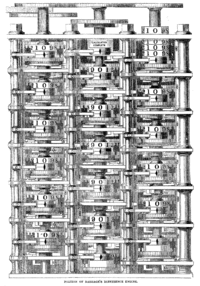Programming Languages
From Just Solve the File Format Problem
(Difference between revisions)
Dan Tobias (Talk | contribs) |
m |
||
| Line 32: | Line 32: | ||
* [[CFEngine]] | * [[CFEngine]] | ||
* [[ChordQL]] | * [[ChordQL]] | ||
| + | * [[Clipper programming language]] | ||
* [[Clojure]] | * [[Clojure]] | ||
* [[COBOL]] (COmmon Business-Oriented Language) | * [[COBOL]] (COmmon Business-Oriented Language) | ||
| Line 40: | Line 41: | ||
* [[D]] | * [[D]] | ||
* [[Dart]] (was Dash) | * [[Dart]] (was Dash) | ||
| − | * [[dBase programming language]] | + | * [[dBase programming language]] |
* [[Erlang]] | * [[Erlang]] | ||
* [[F Sharp|F#]] | * [[F Sharp|F#]] | ||
* [[Forth]] | * [[Forth]] | ||
* [[FORTRAN]] (FORmula TRANslation) | * [[FORTRAN]] (FORmula TRANslation) | ||
| + | * [[FoxPro programming language]] | ||
* [[Go]] | * [[Go]] | ||
* [[Graphics Programming Language]] (GPL) (mid-level language on TI computers) | * [[Graphics Programming Language]] (GPL) (mid-level language on TI computers) | ||
Revision as of 13:44, 12 March 2016
Programming languages are languages expected to be executed (interpreted, compiled, etc.) by a machine in order to perform operations or algorithms. They are distinct from markup languages, which represent the structure of a document rather than specific operations to be performed, though it is possible to combine both in a document (e.g., HTML containing embedded JavaScript, or PHP code which includes HTML). Programming language code is stored as source code which may be directly interpreted by a machine or compiled or assembled into executables.
- ActionScript (Flash)
- Ada
- ALGOL
- APL
- Arduino programming language
- Assembly language (various versions for different machine architectures)
- AutoHotkey
- B
- BASIC (Beginner's All Purpose Symbolic Instruction Code)
- Batch file (DOS, Windows, OS/2)
- BCPL
- BLISS
- BlooP, FlooP, and GlooP
- Bourne shell script: .sh
- Breder
- C
- Ć
- C#
- C++
- C+=
- CEEMAC
- CFEngine
- ChordQL
- Clipper programming language
- Clojure
- COBOL (COmmon Business-Oriented Language)
- CoffeeScript
- COMAL
- Coq
- CPL
- D
- Dart (was Dash)
- dBase programming language
- Erlang
- F#
- Forth
- FORTRAN (FORmula TRANslation)
- FoxPro programming language
- Go
- Graphics Programming Language (GPL) (mid-level language on TI computers)
- Haskell
- High Level Shading Language (HLSL)
- Hoon
- HyperTalk
- INTERCAL
- Java
- JavaScript (JScript, ECMAScript)
- JCL (Job Control Language; used on IBM mainframes)
- Julia
- LISP
- Logo
- Lua
- M4
- Machine language (various versions for different machine architectures)
- MATLAB script file
- mIRC scripting language
- MUMPS (Massachusetts General Hospital Utility Multi-Programming System)
- Music Macro Language
- Nock
- Objective-C (used in Mac and iOS development)
- OpenGL Shading Language (GLSL)
- Pascal
- Pawn
- Perl
- PHP
- Pixie
- Pixilang
- PL/I
- PostScript
- Processing
- Programmable calculators
- Programmable Command Language (PCL), for TOPS-20
- Prolog
- Python
- R
- Rant
- Redcode
- RobotWar
- RPG
- Ruby
- Rust
- S
- SAIL
- Scala
- Scheme
- Scratch
- Smalltalk
- SNOBOL
- SQL
- Swift (Apple)
- Swift (parallel scripting)
- Tcl
- TRAC programming language
- TUTOR
- Visual Basic
- VBScript
- WaveGL
- WebAssembly
- WMLScript
Interactive Fiction engines often use specialized programming languages for game development.
External links
Resources
- A comprehensive list of over 2000 programming languages and a small sample programs for each of them is available here
- Rosetta Code attempts to present solutions to the same task in different programming languages.
- Coding for middle-school girls (tips on introducing them to programming)
- Programming language popularity chart (based on Github and StackOverflow activity)
- Top 10 programming fonts
- What’s The Most Popular Programming Language?
- Which programming language should I learn first?
- Why array indices start at zero; historical info
- Code Academy: learn to code interactively online
- Best free sites for learning how to write code
Commentary
- Why you should learn to program
- Meet the 'Refrigerator Ladies' Who Programmed the ENIAC
- The Moderately Enthusiastic Programmer
- My Experience As A Fourth Grade Hacker
- Things I Wish Someone Had Told Me When I Was Learning How to Code
- A problem with the term, programming “language”
- Discussion of creating programming languages in Arabic
- The Last Line Effect
- Visualizing algorithms
- Excavating Code: An Archaeological Record of Software Development
- The art of the bug: Failure should be fun
Humor
- A Brief, Incomplete, and Mostly Wrong History of Programming Languages
- Programming Language Checklist
- Programming languages as Tolkien characters
- Devil's Dictionary of Programming
- This Is Why You Shouldn't Interrupt A Programmer
- Random mashup generator of the King James Bible and a programming book
- What the computer code seen on screens in movies and TV shows actually does
